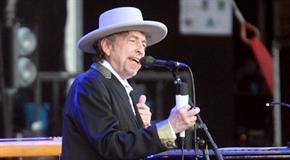Features
Dylan’s Guitar From Newport To Be Auctioned In NYC
Though now viewed as changing American music forever, Dylan’s three-song electric set at the Rhode Island festival that marked his move from acoustic folk to electric rock ‘n’ roll was met by boos from folk purists in the crowd who viewed him as a traitor. He returned for an acoustic encore with “It’s All Over Now, Baby Blue.”
Now the guitar is being offered for sale Dec. 6, Christie’s said. Five lots of hand- and typewritten lyric fragments found inside the guitar case – early versions of some of Dylan’s legendary songs – also are being sold. The lyrics have a pre-sale estimate ranging from $3,000 to $30,000.
With a classic sunburst finish and original flat-wound strings, the guitar has been in the possession of a New Jersey family for nearly 50 years. Dylan left it on a private plane piloted by the owner’s late father, Vic Quinto, who worked for Dylan’s manager.
His daughter, Dawn Peterson, of Morris County, N.J., has said her father asked the management company what to do with the guitar but nobody ever got back to him.
Last year, she took it to the PBS show “History Detectives” to try to have it authenticated. The program enlisted the expertise of Andy Babiuk, a consultant to the Rock and Roll Hall of Fame and owner of an upstate New York vintage instrument shop, and Jeff Gold, a Dylan memorabilia expert. Both men, who appeared on the episode, unequivocally declared the artifacts belonged to Dylan.
Babiuk took the instrument apart and also compared it to close-up color photos of the guitar taken at the 1965 festival.
“I was able to match the wood grain on the body of the guitar … and the unique grain of the rosewood fingerboard. Wood grains are like fingerprints, no two are exactly alike,” Babiuk said in an interview. “Based on the sum of the evidence, I was able to identify that this guitar was the one that Bob Dylan had played in Newport.”
Dylan’s attorney and his publicist did not respond to email and phone requests for comment. Dylan and Peterson, who declined to be interviewed, recently settled a legal dispute over the items.
The terms of the settlement were not disclosed but allowed Peterson to sell the guitar and lyrics, according to Rolling Stone, which wrote in July about Peterson’s quest to authenticate the guitar.
“Representatives for Bob Dylan do not contest the sale of the guitar, and are aware of Christie’s plan to bring it to auction,” a statement issued through Christie’s said.
Dylan has generally looked upon his instruments to convey his art, akin to a carpenter’s hammer, Howard Kramer, curatorial director of the Rock and Roll Hall of Fame, said last year. “I don’t think he’s dwelled on a guitar he hasn’t played for 47 years,” he said. “If he cared about it, he would have done something about it.”
Festival founder George Wein told the AP that when Dylan finished playing, Wein was backstage and told him to go back out and play an acoustic number because that’s what people expected. Dylan said he didn’t want to do it and said he couldn’t because he only had the electric guitar. Wein called out for a loaner backstage and about 20 musicians raised their acoustic guitars to offer them.
The lyrics for sale include “In the Darkness of Your Room,” an early draft of “Absolutely Sweet Marie” from Dylan’s “Blonde on Blonde” album, and three songs from the record’s 1965 recording session that were not released until the 1980s: “Medicine Sunday” (the draft is titled “Midnight Train”), “Jet Pilot” and “I Wanna Be Your Lover.”

Dylan’s “going electric changed the structure of folk music,” the 88-year-old Wein said. “The minute Dylan went electric, all these young people said, ‘Bobby’s going electric, we’re going electric, too.’“